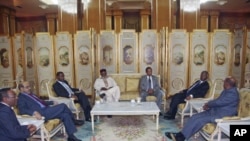Talks on the future of a divided Sudan have been disrupted by the latest escalation of hostilities in the country's Southern Kordofan state. An urgent African Union-United Nations mission is heading Thursday to Southern Kordofan in an attempt to broker a ceasefire.
Former South African President and chief AU Mediator Thabo Mbeki, along with U.N. Special Envoy to Sudan Haile Menkerios will lead the hastily-arranged mission. The initiative is aimed at stopping more than a week of clashes between north Sudan army troops and fighters aligned with the south's Sudan People's Liberation Army [SPLA].
Top southern official Yasir Arman tells VOA he will accompany the mission for talks with Abdul Aziz, who commands SPLA forces in the north.
"President Mbeki and Haile Menkerios, the representative of the secretary general, together with the SPLM north leaders will be going to meet commander Abdul Aziz and we will discuss matters related to security and political arrangements in the two areas and in the North in general," said Arman.
The South Kordofan fighting disrupted a fourth day of north-south talks in Addis Ababa on the future of the disputed Abyei border region. The sides are said to be close to a deal calling for the demilitarization of Abyei and deployment of a U.N.-mandated peacekeeping force.
Ethiopia reportedly is ready to send 1,500 peacekeepers to patrol the border, and the U.N. Security Council is said to be standing by to authorize the force once a deal is reached.
Diplomats and Southern Sudanese negotiators warned Wednesday, though, that the talks could collapse over the surge of violence in South Kordofan that has displaced an estimated 60,000 people.
A statement issued Wednesday by the U.N. humanitarian affairs office told of a “growing sense of panic” among some of the displaced populations who find themselves trapped by the ongoing violence and ethnic fault lines.
Deng Alor, minister of regional cooperation in the South Sudan government, said the reported aerial bombardments and killings of the past few days have infuriated SPLA forces in the north to the point where they may refuse the Mbeki-Menkerios ceasefire appeal.
"They are asking for a ceasefire, we are saying no, there are political issues that need to be addressed first, before you come and discuss ceasefire, even before ceasefire and security arrangements there are issues connected with the SPLA in South Kordofan and Blue Nile, their integration into the Sudanese Army," said Alor. "These things must precede the ceasefire."
South Kordofan will be north of the border when the south breaks away from Khartoum’s rule on July 9. It contains most of the oil reserves that will be under Khartoum’s control, though nearly three quarters of Sudan’s oil reserves are in the south.
But much of the region’s population remain sympathetic to the southern rebels who fought for independence from Khartoum. An estimated 40,000 SPLA soldiers are based there. Alor said the fate of those soldiers must take precedence over a ceasefire.
"It’s unfortunate people are dying, but it’s a situation created by [Sudanese President] Bashir," said Alor. "Bashir wanted to disarm 40,000 troops. He asked us to disarm them, more than 40,000 from Blue Nile, and hand them over to him. We told him there is no way we can disarm more than 40,000 troops."
U.S. President Barack Obama on Tuesday urged the Khartoum government to cease its military actions immediately. In a sign of growing U.S. concern about the South Kordofan violence, the president broadcast a message urging both sides to “live up to their responsibilities” to avoid a return to civil war.
Southern Kordofan Fighting Disrupts Sudan Talks in Addis Ababa















